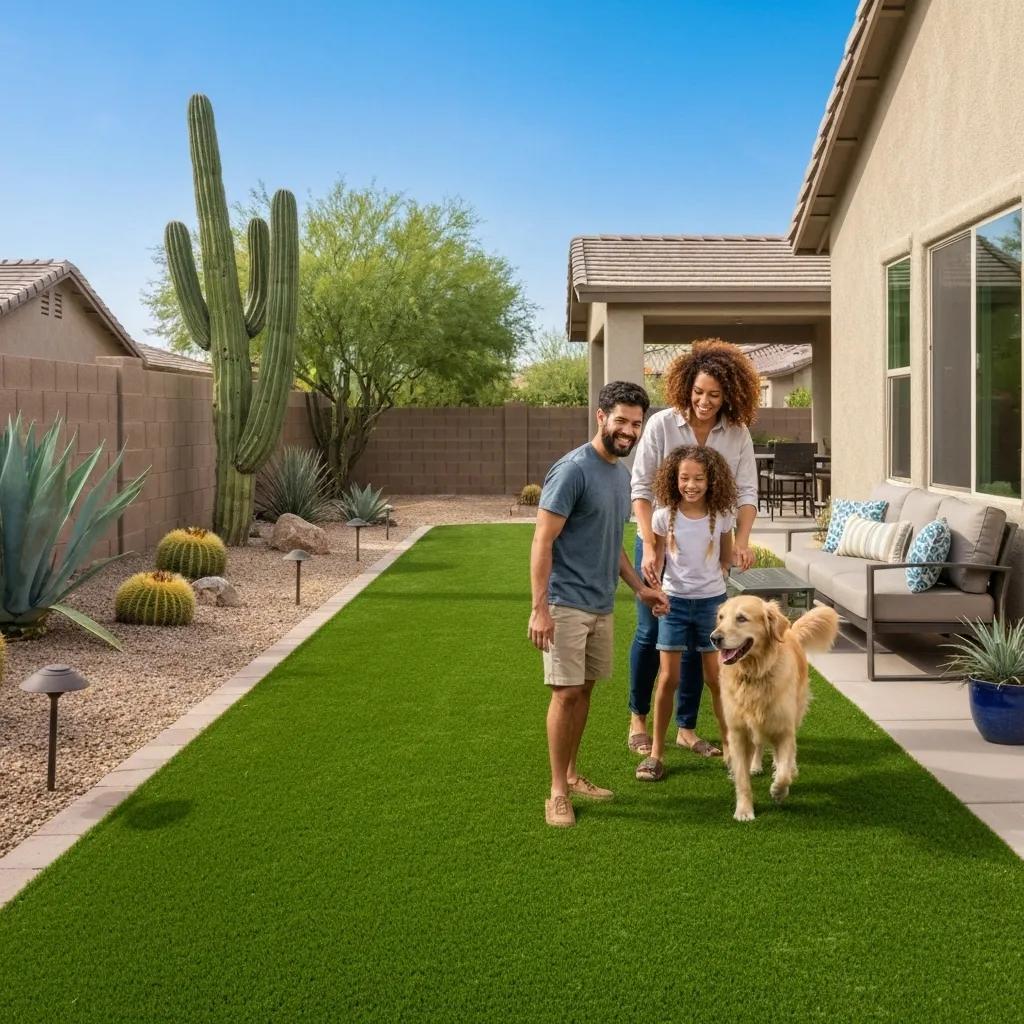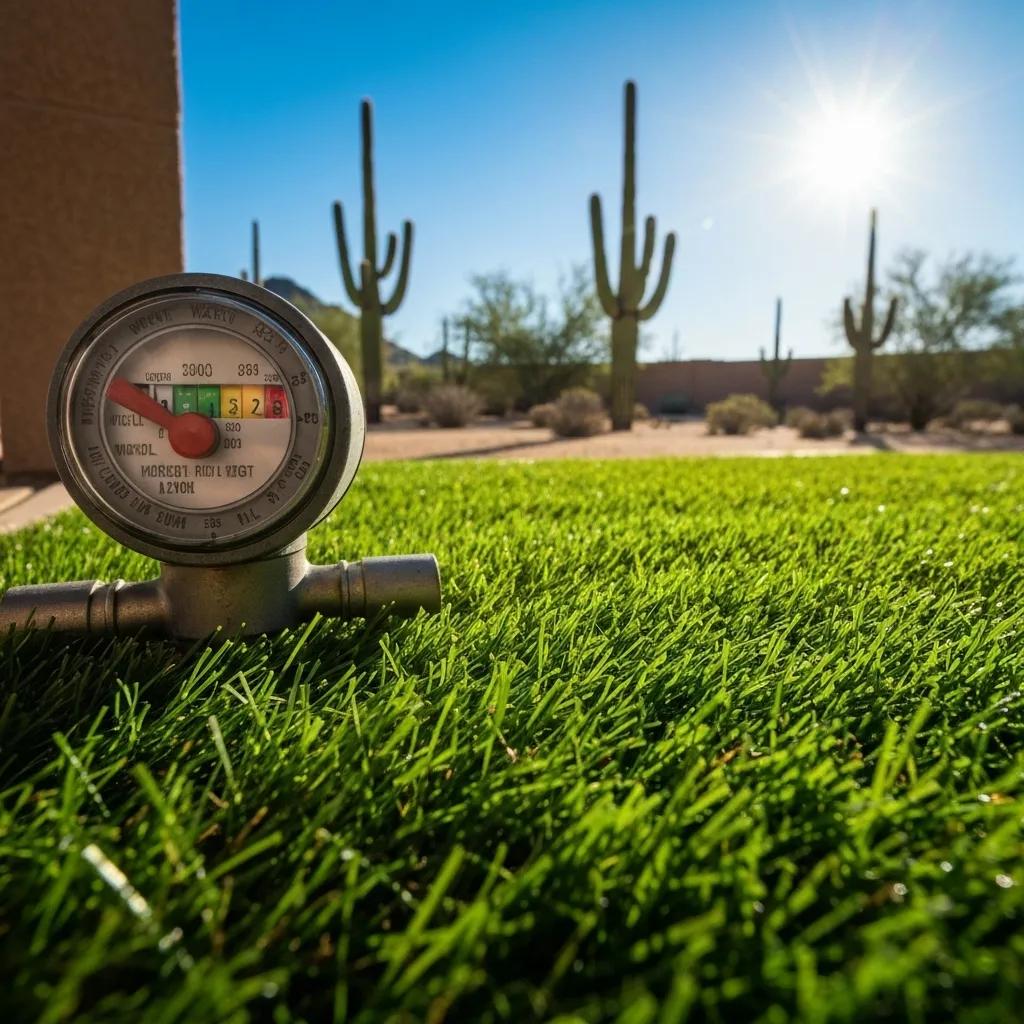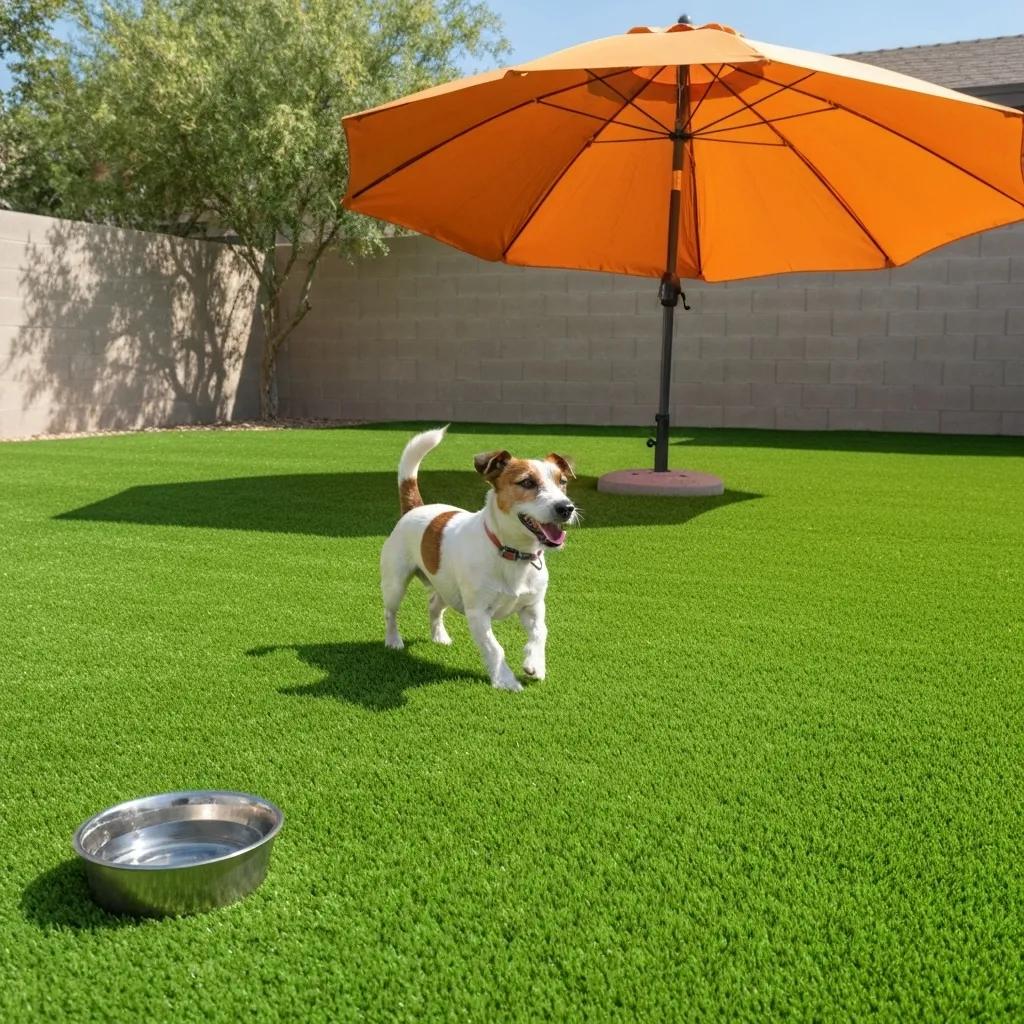
By Mychael Parker
Phoenix residents are grappling with soaring water bills, the constant grind of lawn maintenance, and the harsh desert sun that takes a toll on natural grass. Artificial grass offers a smart, proven answer: slash your water usage, ditch the endless chores, and enjoy stunning curb appeal year-round. This isn’t just about looks; it’s about transforming your Phoenixlandscape into a sustainable, low-effort asset. In this guide, we’ll show you how synthetic turf can save thousands of gallons every year, cut your maintenance expenses, stand up to extreme heat, provide a safe haven for pets, boost your property’s value, and offer unbeatable wholesale pricing for landscapers and contractors.

Artificial grass slashes water consumption by replacing thirsty, irrigated lawns with synthetic turf that requires zero watering. This immediate change can reduce your household’s water usage by up to 70%.
The TurfYard, (2024-10-10)
By switching from natural grass to artificial turf, Phoenix homeowners can save thousands of gallons of water annually. Since synthetic turf eliminates the need for irrigation, it can cut water usage by as much as 70%. This is a crucial step in addressing Phoenix’s water scarcity and offers significant long-term financial benefits.
This insight reinforces the article’s point that artificial grass is a key water-saving solution for Phoenix homes.
Phoenix receives less than 8 inches of rain annually, making natural lawns heavily reliant on irrigation. Water costs are climbing faster than inflation, and outdoor watering can easily account for over two-thirds of a household’s water bill. Embracing water-wise landscaping, like artificial turf, is vital for financial stability and responsible environmental stewardship in the Valley of the Sun.
For a typical 1,800-square-foot lawn, artificial turf can save between 50,000 and 100,000 gallons of water each year. By eliminating the need for daily watering, homeowners can reduce their outdoor water consumption by 60–80%, leading to annual savings of $400–$800 and helping to preserve our precious desert aquifers.
Phoenix and its surrounding communities often provide rebates of up to $1 per square foot for turf conversions through water-wise landscaping programs. These incentives might include credits on your water bill or expedited permits for xeriscape upgrades. It’s always best to check with your local water provider for the most current eligibility requirements and application procedures.
Switching to synthetic turf offers broader environmental advantages by eliminating the need for chemical fertilizers, herbicides, and gas-powered mowing equipment. Reducing emissions from lawnmowers and preventing fertilizer runoff helps improve air quality and protects our urban waterways from nutrient pollution.
To estimate your potential water savings, take your lawn’s square footage and multiply it by the average annual gallons per square foot needed for natural grass (around 56 gallons). Then, subtract the zero irrigation requirement of synthetic turf. For instance, an 1,800-square-foot lawn needing approximately 100,800 gallons yearly would save that entire volume by switching to artificial grass.
Artificial grass significantly reduces upkeep by eliminating time-consuming tasks like mowing, fertilizing, and pest control. This frees homeowners from weekly chores and associated expenses, offering a consistently green lawn year-round without seasonal treatments, allowing for more enjoyment of outdoor living spaces.
Synthetic turf is built with UV-stabilized, factory-colored fibers that never grow or develop bare patches. Without the need for fertilizers, pesticides, or trimming, homeowners avoid the costs, storage issues, and chemical runoff associated with traditional lawn care equipment.
Typically, homeowners spend $500–$700 annually on maintaining a natural lawn, covering equipment, chemicals, and professional services. Transitioning to artificial turf can cut these expenses by over 90%, often allowing the installation costs to be recouped within three to five years.
By eliminating mowing, edging, and seasonal yard preparation, families can reclaim up to 60 hours per year previously dedicated to lawn care. This translates to more leisure time, greater enjoyment of backyards, and less stress associated with yard work.
| Service or Product | Natural Lawn Cost | Artificial Turf Cost |
|---|---|---|
| Mowing and Trimming | $300 | $0 |
| Fertilizer and Chemicals | $150 | $0 |
| Pest Control and Weed Spray | $100 | $0 |
| Equipment Fuel & Repairs | $150 | $0 |
| Total Annual Cost | $700 | $0 |
By completely removing these recurring expenses, synthetic turf offers predictable and minimal ongoing costs.
Modern artificial grass is engineered to withstand Arizona’s intense sun and heavy use, maintaining its performance without fading, matting, or degrading over many years.
Manufacturers integrate UV-inhibitors, color-locked polyethylene fibers, and advanced cooling infills like zeolite granules. These technologies help reflect heat and keep the surface temperature more comfortable, preventing rapid color fading and reducing surface heat by up to 30%.
High-quality synthetic turf can maintain its appearance and functionality for 15–20 years, even in harsh desert conditions. Its multi-layer backing and reinforced stitching are designed to resist blade damage from constant sunlight and occasional monsoon rains.
Artificial grass features high fiber density and robust backing systems that distribute weight evenly, resisting compaction and wear. This ensures it maintains its appearance and cushioning, whether on sports fields, playgrounds, or busy family yards.
To keep your artificial grass cool and vibrant, rinse the surface monthly to clear away dust. Inspect infill levels annually and refresh with cooling granules every two years. These simple steps help maintain both comfort and color longevity.

Pet-friendly artificial grass is designed with safety, superior drainage, and odor control in mind, creating hygienic and comfortable play areas that are more durable and cleaner than traditional lawns.
Premium petturf is made with non-toxic, lead-free materials and antimicrobial infills that prevent bacterial growth. The design of the blades and backing material ensures there are no sharp edges, keeping paws safe during playtime.
European Company, (2025-07-09)
Artificial grass offers a cleaner, more hygienic environment for pets, featuring excellent drainage and odor control. Pet-friendly turf utilizes non-toxic materials and antimicrobial infills to inhibit bacteria and manage odors, creating a safe and comfortable play space.
This research supports the article’s points about the advantages of pet-friendly artificial grass.
Advanced drainage channels built into the synthetic surface allow for rapid water runoff, while infills treated with zeolite or baking soda effectively neutralize odors. The dry desertheat helps excess moisture evaporate quickly, preventing standing water and unpleasant smells.
To create an ideal pet run, start with a gently sloped base of compacted aggregate, install turf with built-in drainage, and edge the perimeter with pavers or curbing. Adding a shade structure and a water station will ensure comfort for your pets, especially during the hot summer months.
To keep petturf hygienic, hose it down weekly, promptly remove solid waste, and replenish antimicrobial infill annually. Occasional brushing will help restore the blade’s upright position and ensure consistent drainage.
Artificial grass instantly boosts curb appeal with its consistently lush, green appearance year-round, increasing perceived value and buyer interest while providing a polished, maintenance-free landscape.
Synthetic turf maintains a vibrant, consistent green color through all seasons, eliminating unsightly brown patches, muddy areas, and uneven growth. Its uniform texture and realistic blade blends create an instantly premium, manicured look.
Homes featuring attractive, low-maintenance lawns can command 5–7% higher market prices and sell approximately 20% faster than similar properties with natural grass. The modern aesthetic and eco-friendly appeal resonate strongly with today’s environmentally conscious buyers and busy families.
Beyond full lawn coverage, artificial grass can be expertly shaped into backyard putting greens, stylish patio inlays, safe playground zones, and chic rooftop terraces. Its flexibility allows for intricate patterns, contrasting stone accents, and seamlessly integrated pathways.
Phoenix-area professionals can access bulk artificial grass orders, attractive volume discounts, and logistical support specifically designed for large-scale residential and commercial projects through our specialized wholesale programs.
Our wholesale pricing structure offers discounts of up to 30% off retail rates for larger orders. This allows contractors to reduce project costs, enhance their bid competitiveness, and secure healthy profit margins on multi-site installations.
We maintain local warehouses stocked with a wide variety of turf types and infill materials, ensuring same-week dispatch of rolls and accessories. Our coordinated delivery schedules and efficient unloading support streamline on-site preparation for rapid installations.
Installers are encouraged to apply for a contractor account to gain access to dedicated project managers and receive expert technical training on optimal subbase preparation and turf installation techniques. Our high-volume clients also benefit from priority scheduling and flexible credit terms.
Contractors can easily request a quote by submitting their project’s square footage, desired turf selections, and required delivery timeline. We will then provide a detailed proposal including tiered pricing, logistical planning, and installation guidance.
When evaluating the costs and returns, it’s clear that while the initial investment for installed synthetic turf typically ranges from $10 to $18 per square foot, the long-term savings and value appreciation often make artificial grass the most financially sound landscaping choice.
Average installation costs cover the turf materials, infill, subbase preparation, and labor, generally falling between $10–$18 per square foot. Factors like turf grade, pile height, infill type, and site complexity will influence the final price.
Most homeowners can expect to recoup their investment within three to five years, thanks to combined savings on water, reduced maintenance, and increased property market value.
Big Bully Turf, (2025-06-05)
Phoenix homeowners can recover their investment in artificial turf within three to five years through savings on water, maintenance, and enhanced property value. By cutting expenses by over 90%, artificial turf typically saves homeowners between $400 and $800 annually in utility costs.
This research supports the article’s findings on the cost-effectiveness of artificial grass.
Beyond the direct elimination of lawn care expenses, homeowners also save on equipment upkeep, chemical purchases, and water wasted during summer irrigation shutdowns. Annual utility savings can easily surpass $500, significantly boosting the financial advantage over the turf‘s 15-year lifespan.
Investing in artificial grass aligns Phoenix homeowners with smart, sustainable landscaping practices while delivering tangible financial and lifestyle advantages. From drastically cutting water usage and enhancing curb appeal to supporting efficient bulk installation projects, synthetic turf stands out as the premier choice for desert living. Partnering with a dedicated wholesale supplier ensures you receive top-quality products, expert technical support, and cost-effective solutions that are built to endure Arizona’s demanding climate and meet customer expectations.
Phoenix homeowners can take advantage of various rebates and incentives when transitioning to artificial grass. Local water conservation programs often provide cash incentives to offset the initial installation costs, helping make the switch more affordable. These programs recognize the long-term water savings and environmental benefits of synthetic turf, making it a strategic choice for water-conscious homeowners in the region. Arturficial Wholesale can provide guidance on accessing these incentives and maximizing the financial returns of an artificial grass installation.
Additionally, many homeowner associations and municipal codes in Phoenix now encourage or even mandate the use of water-efficient landscaping like artificial turf. By embracing this trend, homeowners can not only save money but also enhance their property's curb appeal and comply with local regulations. Arturficial Wholesale can help homeowners navigate these guidelines and ensure their synthetic grass installation meets all necessary requirements.
One of the primary benefits of artificial grass for Phoenix homes is the minimal maintenance required. Unlike natural grass, synthetic turf eliminates the need for mowing, edging, fertilizing, and other time-consuming lawn care tasks. This frees up homeowners to enjoy their outdoor spaces without the burden of weekly chores. Arturficial Wholesale's artificial grass products are engineered to withstand the extreme heat and harsh conditions of the Phoenix climate, maintaining their lush appearance and performance for many years.
Phoenix's intense sun and heavy foot traffic can take a toll on natural grass, leading to unsightly brown patches and uneven surfaces. Arturficial Wholesale's synthetic turf is designed with advanced UV-inhibitors, color-locked fibers, and durable infill to resist fading, matting, and degradation. This ensures a consistently vibrant, safe, and comfortable play area for pets and family activities, even in the most demanding Arizona environments. Arturficial Wholesale's artificial grass solutions are built to last, providing a low-maintenance, high-value landscaping option for Phoenix homeowners.
Artificial grass from Arturficial Wholesale offers homeowners in Phoenix the flexibility to create custom, visually appealing landscape designs. Beyond full lawn coverage, synthetic turf can be expertly shaped into backyard putting greens, stylish patio inlays, and chic rooftop terraces. Its versatility allows for intricate patterns, contrasting stone accents, and seamlessly integrated pathways, giving homeowners the freedom to enhance their outdoor spaces with a polished, maintenance-free aesthetic.
Arturficial Wholesale's artificial grass instantly boosts curb appeal with its consistently lush, green appearance year-round. This increased visual appeal can translate to higher perceived property value and greater buyer interest when it comes time to sell. By eliminating the seasonal changes and maintenance issues of natural grass, synthetic turf from Arturficial Wholesale provides a beautiful, low-effort landscaping solution that elevates the overall look and feel of Phoenix homes.
Phoenix-area landscapers, contractors, and property managers can access bulk artificial grass orders, attractive volume discounts, and logistical support through Arturficial Wholesale's specialized wholesale programs. This allows professionals to reduce project costs, enhance their bid competitiveness, and secure healthy profit margins on multi-site artificial grass installations. Arturficial Wholesale's expertise in the Phoenix market ensures they can provide tailored solutions, technical guidance, and efficient delivery logistics to meet the unique needs of local projects.
By partnering with Arturficial Wholesale, Phoenix professionals can offer their clients top-quality artificial grass products and exceptional customer service. Arturficial Wholesale's dedicated support helps streamline the specification, procurement, and installation process, allowing contractors to focus on delivering successful projects that showcase the benefits of synthetic turf to homeowners. This collaboration with Arturficial Wholesale empowers Phoenix-based professionals to expand their artificial grass offerings and stay ahead of the competition.